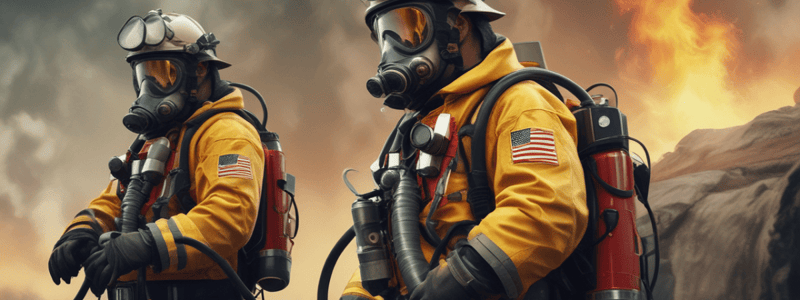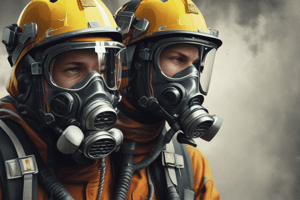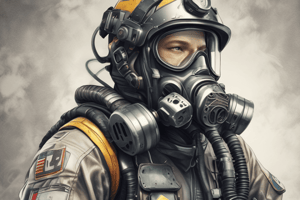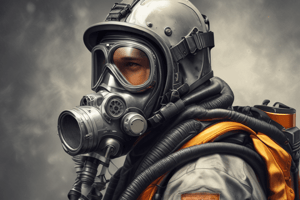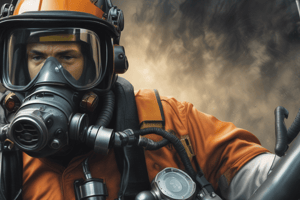Podcast
Questions and Answers
When is it required to wear SCBA and be 'on air'?
When is it required to wear SCBA and be 'on air'?
- Only when the Officer In Charge deems it necessary
- Only in elevated temperatures
- In all hazardous environments, including confined spaces and biologically hazardous atmospheres (correct)
- Only in oxygen deficient atmospheres
What is the primary purpose of wearing a flash hood?
What is the primary purpose of wearing a flash hood?
- To protect the wearer's neck and face from the SCBA facepiece (correct)
- To protect the head from fire
- To protect the face from smoke
- To protect the wearer's hair from damage
When must SCBA be worn throughout overhaul?
When must SCBA be worn throughout overhaul?
- Only when the Officer In Charge deems it necessary
- Only when visibility is poor
- Regardless of visibility or Carbon Monoxide (CO) readings (correct)
- Only when there are hazardous materials present
Who is responsible for ensuring personnel wear SCBA as required?
Who is responsible for ensuring personnel wear SCBA as required?
When are 60-minute rated cylinders used?
When are 60-minute rated cylinders used?
What is the procedure for doffing SCBA?
What is the procedure for doffing SCBA?
Why is it important to be free from hair interference when wearing a SCBA?
Why is it important to be free from hair interference when wearing a SCBA?
What is the procedure for SCBA once it is no longer required?
What is the procedure for SCBA once it is no longer required?
What is the minimum residual pressure required for storing empty air cylinders?
What is the minimum residual pressure required for storing empty air cylinders?
How often should SCBA cylinders be refilled with compressed breathing air if they have not been used?
How often should SCBA cylinders be refilled with compressed breathing air if they have not been used?
What is the purpose of reusable dust caps on SCBA cylinders?
What is the purpose of reusable dust caps on SCBA cylinders?
How many spare 45-minute SCBA cylinders should be carried on each fire vehicle?
How many spare 45-minute SCBA cylinders should be carried on each fire vehicle?
What is the pressure at which a SCBA cylinder is considered full?
What is the pressure at which a SCBA cylinder is considered full?
Why should SCBA cylinders not be filled during a Smog Alert?
Why should SCBA cylinders not be filled during a Smog Alert?
What is the colour code for SCBA cylinders filled in an odd-numbered year?
What is the colour code for SCBA cylinders filled in an odd-numbered year?
Where should MSA 3000 confined space escape cylinders be refilled?
Where should MSA 3000 confined space escape cylinders be refilled?
Study Notes
Wearing SCBA and "On Air"
- SCBA must be used in hazardous environments, including elevated temperatures, toxic atmospheres, oxygen deficient atmospheres, confined spaces, biologically hazardous atmospheres, and areas where the Officer In Charge deems respiratory protection is required.
- SCBA must be worn and "on air" at all times while inside any structure that has been on fire.
- SCBA must be worn throughout overhaul and not removed, regardless of visibility or Carbon Monoxide (CO) readings.
SCBA Usage and Cylinders
- 60-minute (2491L) rated cylinders must be used with Level A suits, in subway stations, during decon procedures, and when deemed necessary by the Officer In Charge.
- Chief Officers are not required to use SCBA while directing operations and maintaining radio communications outside the controlled area.
- SCBA must be immediately returned to the apparatus after use.
SCBA Maintenance and Inspection
- Persons required to wear SCBA must be free from hair interference where the facepiece seals to the skin.
- SCBA may be doffed once outside the controlled area following gross decon to remove heavy contamination.
- Each member of TFS must be familiar with TFS Training Note 103.2.10 – Post Use Care and Cleaning, which addresses cleaning and sanitizing of SCBA.
SCBA Cylinders and Storage
- Four spare 45-minute (1868L) SCBA cylinders should be carried aboard each fire vehicle.
- SCBA cylinders must be refitted with a full cylinder immediately after use, whether at an emergency scene or a training exercise.
- A cylinder is considered full at a pressure of 4,050 psi (27,579 kPa) or approximately 90% of the 4,500 psi (31,026 kPa) rated capacity.
- All empty air cylinders must be stored with the valve in the closed position with a minimum residual pressure of 690 kPa (100 psi) to prevent contamination.
Cylinder Maintenance and Inspection
- Reusable dust caps must be in position on the cylinder when not connected to an air supply or breathing unit.
- Dust caps protect cylinder valve couplings from moisture and dirt.
- SCBA air cylinders that have not been used in 12 months must be slowly depressurized and refilled with compressed breathing air meeting CSA standards.
- Dust caps shall be color-coded according to the year of filling (red for odd number years, blue for even number years).
- MSA 3000 confined space escape cylinders shall only be refilled at the SCBA repair room. Spares are available on the North and South Air/Light.
Studying That Suits You
Use AI to generate personalized quizzes and flashcards to suit your learning preferences.
Description
This quiz covers the guidelines for wearing SCBA and being 'on air' in hazardous environments, including fires, toxic atmospheres, and confined spaces.
